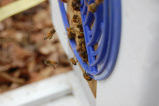|
Today is the first full day of spring here in New England and our honey bees are getting eager to start foraging for the early pollen that will be produced by the numerous crocus plants, willows and sugar maples around our apiaries. Honey bees are incredibly resourceful and will find any pollen that is being produced in the nearby area. Last Friday, the bees in Portsmouth were flying and bringing back loads of beautiful yellow/orange pollen produced by the Yellow Crocus flowers around town. Pollen is vital to the honey bees at this time of year because it is the primary source of protein for the bees and is critical for brood development within the hive. Lack of protein will delay the buildup of worker bees needed to take full advantage of the first nectar flows. The video below shows a worker bee coming back laden with pollen and doing the waggle dance to alert the others in the hive of her find. The dance is instrumental in providing directions to the other foragers on the location of the pollen source. In this case, the pollen source was Yellow Crocus.
2 Comments
Back before petroleum based waxes were available skiers utilized natural ingredients to wax the bottom of their skis. We will not go into the specifics of glide and grip but we will let you know that we have been experimenting with our friends at Pioneers Board Shop in North Hampton on a beeswax based snowboard/ski wax that is effective and 100% natural and biodegradable. Our 5th formula seems to have made a big improvement on glide and I tested it in some perfect conditions at Sunday River at the end of February. Snow conditions and weather play a big role in the type of wax one can use but so far our test batches have performed well over the synthetic waxes that are found on the market. Contact us at [email protected] if you are interested in testing our formula.
With St. Patty's day coming up soon we thought it would be a good idea to post a podcast we did with our friends from Beara Brewing. Beara is located in Portsmouth, NH and has developed some innovative beers including a Honey Brown Beer that uses Seabee Honey. We have packaged a good amount of bees in our time and we have been asked to share our process. Here is how we do it. Please note, this is our take and please use this as a reference. We recommend you follow the instructions you have been provided by your bee supplier but feel free to ask us questions on how we take on this process. Step 1: We wet the bees down while they are in the package with warm water. Don't soak them too much. If it is a colder day we sometimes skip this step. Step 2: Next remove the wood that is covering the feed can. Use your hive tool and keep the cover close by for when you are finished with Step 3: Carefully remove the can from the hive. Keep hold of the metal tab, which is attached to the queen cage and slowly remove the can. This can be tricky but the key is to work the can up without dropping the queen cage into the cluster. Once the can is removed, put the wood cover back over the opening and set the queen and can aside. Step 4: One side of the cage has white candy in it with a cork. The other side has just a cork. Remove the cork from the candy side only. Step 5: We then hang the queen cage with the candy side facing down. If there are worker bees in the cage with queen then hang the cage candy side facing up. The cage should be centered and placed 3 to 4 frames from the side of the hive. Step 6: Before dumping the bees, bump the box on the ground to get the bees at the bottom of the package. Now take off the cover and shake the bees over the frames right over the queen. You can do this with half the bees and let them get settled before dumping the rest. However, we typically shake the bees all at once. Step 7: Shake the package side to side to get the last remaining bees. We try to empty them all out but if there are stragglers we place the box in front of the hive. Step 8: We then place the remaining frames back into the hive and make sure the hive has a source of food. We like to use in frame feeders that take up a frame space. Step 9: Seal the hive up with the outer cover and then use an entrance reducer with the smallest opening option. Step 10: We do not inspect the hive until at least 6 days later. Categories All |
Details
SEABEE HONEY BLOGAuthorA beekeeper in New Hampshire [email protected] Archives
December 2023
Categories
All
|

 RSS Feed
RSS Feed